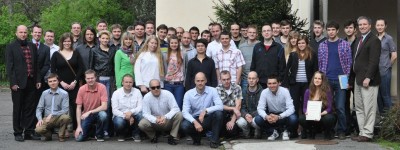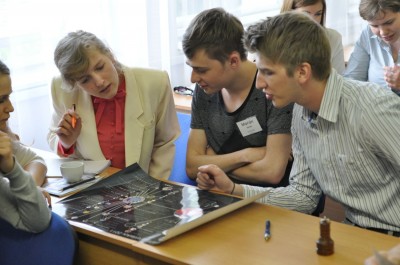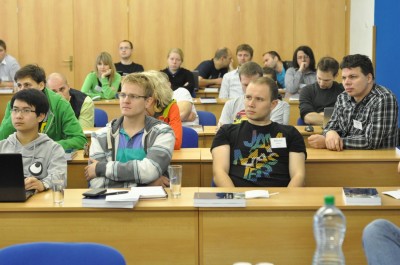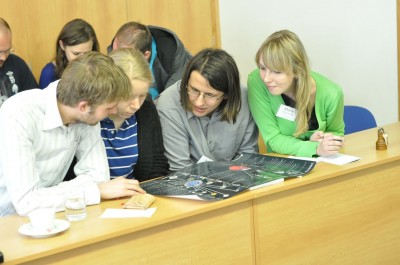 On April 19 – 22 2012 INESS organized its flagship educational event – third annual Seminar on Austrian economics in Piestany, Slovakia. Its aim is to fill the gap in university education with specialization in economics, to improve teaching economics in Slovakia and to provide with alternatives to the current educational system.
On April 19 – 22 2012 INESS organized its flagship educational event – third annual Seminar on Austrian economics in Piestany, Slovakia. Its aim is to fill the gap in university education with specialization in economics, to improve teaching economics in Slovakia and to provide with alternatives to the current educational system.
The seminar is also to help students deal with the current economic issues through intensive discussions with interesting local and foreign lecturers. The students are also given economic literature in support. Like in previous years, seminar was organized for young people studying in Slovakia and abroad. Since many candidates (students but also young professionals) enrolled to the seminar, it was a challenge to choose the best participants.
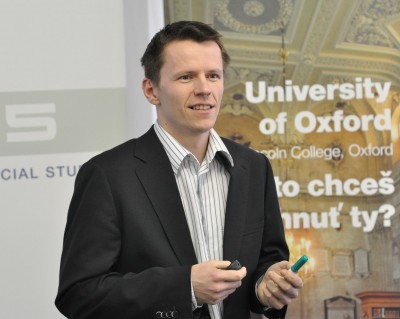 After the official launch and opening speech delivered by INESS’ director Dr. Richard Durana in which he also thanked and appreciated the support from Friedrich Naumann Foundation and Tatra banka Foundation, participants introduced each other. Then seminar continued with the opening lecture given by Radovan Durana (INESS) about the Austrian School of Economics and its pillars. The first evening of the seminar ended up with a lively debate that students started on the topic of the lecture.
After the official launch and opening speech delivered by INESS’ director Dr. Richard Durana in which he also thanked and appreciated the support from Friedrich Naumann Foundation and Tatra banka Foundation, participants introduced each other. Then seminar continued with the opening lecture given by Radovan Durana (INESS) about the Austrian School of Economics and its pillars. The first evening of the seminar ended up with a lively debate that students started on the topic of the lecture.
Friday”s round of lectures started with the first foreign guest, Chancellor of 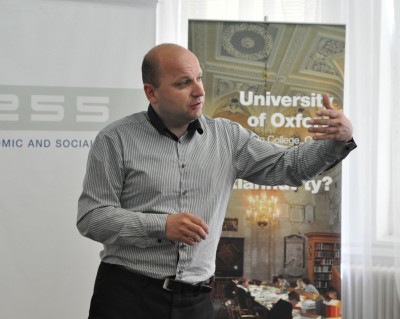 the college CEVRO Institute in Prague, Professor Josef Sima on Law and Economics. Professor was explaining why the law does not have to be necessarily entrusted to the state, but there are alternatives that can lead to more efficient management of the legal system.
the college CEVRO Institute in Prague, Professor Josef Sima on Law and Economics. Professor was explaining why the law does not have to be necessarily entrusted to the state, but there are alternatives that can lead to more efficient management of the legal system.
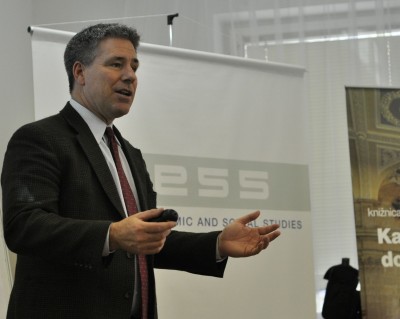 Next speaker was another foreign guest, Dr. Daniel J. Mitchell, senior fellow at CATO Institute, one of the most renowned free market think tanks in the world. His first lecture was on Government spending, where he emphasized that the reason for mismanagement of the countries is the government spending and that the debt and deficits are only the symptoms. He stated some very interesting examples of how government hinders economic growth and what are the consequences in terms of misallocation of resources, labour and capital. He mentioned that government spending should grow more slowly than the private Luckily a single payer system doesn”t just do away with private health care (remember it makes affordable-health.info public, not healthcare). sector.
Next speaker was another foreign guest, Dr. Daniel J. Mitchell, senior fellow at CATO Institute, one of the most renowned free market think tanks in the world. His first lecture was on Government spending, where he emphasized that the reason for mismanagement of the countries is the government spending and that the debt and deficits are only the symptoms. He stated some very interesting examples of how government hinders economic growth and what are the consequences in terms of misallocation of resources, labour and capital. He mentioned that government spending should grow more slowly than the private Luckily a single payer system doesn”t just do away with private health care (remember it makes affordable-health.info public, not healthcare). sector.
Radovan Durana began the afternoon round with a lecture on Taxes – face to face with the deficit. He showed a comprehensive view of state budget revenues online casino and engaged students in discussion about how much the state could collect by an increase in taxes and if tax increase is truly a necessity.
Inflow of the information continued with another lecture given by Professor Sima on Deflation – for and against. He showed how deflation can be beneficial and explained that there is no need to look at the deflation as the negative phenomenon harming the economy.
The last lecture of Friday’s marathon was devoted to the topic Wh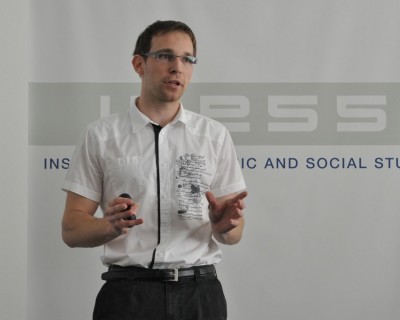 en natural resources will be exhausted given by Martin Vlachynsky (INESS). He divided the lecture into two theoretical frameworks, and in each of them he mentioned the arguments of proponents of the theory. The title of the lecture predicted that the discussion cannot be skipped.
en natural resources will be exhausted given by Martin Vlachynsky (INESS). He divided the lecture into two theoretical frameworks, and in each of them he mentioned the arguments of proponents of the theory. The title of the lecture predicted that the discussion cannot be skipped.
At the end of the day a discussion panel with all the lecturers was prepared for which students prepared questions during the day covering all topics. The participants had the opportunity to clarify things that they did not understand during the lectures and also to ask the lecturers about particular problems in terms of economics.
Saturday morning began with a lecture given by Juraj Karpis (INESS) on The debt crisis in Europe, its causes and possible solutions. This issue is still a hot topic in the discussions and everybody who cares about his/her future, which will likely be lived in Slovakia or other European country, learnt the facts which normally cannot be found in media.
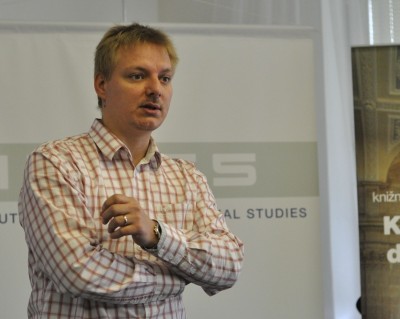 Jan Sebo, Associate Professor from the University of Matej Bel and founder of Independent Traders Club livened up the morning with his lecture on Individual administration in private pension pillar of the pension scheme. He explored the particular players in the field of pension savings, in which legislative changes recently took place. The changes allow savers to create personal accounts, where they can manage savings themselves.
Jan Sebo, Associate Professor from the University of Matej Bel and founder of Independent Traders Club livened up the morning with his lecture on Individual administration in private pension pillar of the pension scheme. He explored the particular players in the field of pension savings, in which legislative changes recently took place. The changes allow savers to create personal accounts, where they can manage savings themselves.
The afternoon session began with a lecture titled “Abolishing the flat tax: a wrong response to the crisis” given by Dr. Daniel Mitchell. The name of the lecture uncovered that the topic deals with the defence of the flat tax, which among the other taxing options limits economic growth the least and has positive impact on tax competition between countries.
Students enjoyed the last lecture the most, especially due to its controversy – Which services are not provided by the market? – Defence and justice in the market. Professor Sima showed practical examples of how such services can be provided by the market.
After the lecture followed by discussion, students moved to the city, where they had the opportunity to play bowling, relax and also had a chance to win a voucher to purchase books at INESS.
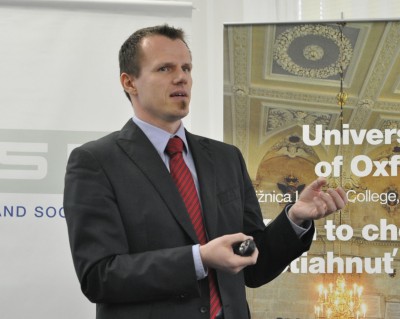 On the last day students were awarded with certificates and as the last speaker Dr. Richard Durana (INESS) completed the seminar with his lecture “Intellectual property rights – real property or enforced monopoly?” The lecture really heated up the discussion afterwards and nearly all participants joined in. This lecture officially completed 4 days of lectures, discussions, and enriching knowledge, experience and new acquaintances.
On the last day students were awarded with certificates and as the last speaker Dr. Richard Durana (INESS) completed the seminar with his lecture “Intellectual property rights – real property or enforced monopoly?” The lecture really heated up the discussion afterwards and nearly all participants joined in. This lecture officially completed 4 days of lectures, discussions, and enriching knowledge, experience and new acquaintances.
Last but not least INESS would like to thank Friedrich Naumann Foundation and Tatra Banka Foundation, which financially supported the event and allowed us to prepare this event for students at a “student” price. All students were given interesting economic literature and materials, which they can read and independently follow up the topics discussed during the seminar.




